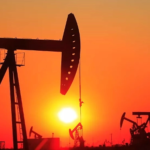Reports making the rounds say that a full ban on Russian would be part of an expanded package of sanctions on Russia by the European Union (EU).
Reuters reported on Monday that EU ministers are set to discuss a ban on Russian oil in an effort to force Russia to abandon its military operation in Ukraine. The new sanctions will also reportedly add more names of Russian individuals to EU blacklists.
On 24 February 2022, Putin announced that he had made the decision to launch a “special military operation” in eastern Ukraine, within minutes of Putin’s announcement, the Russian army invaded Ukraine.
Also read; Germany seals gas deal with Qatar, will construct two new LNG terminals
EU foreign and defense ministers are expected to debate the matter on Monday, ahead of the arrival of US President Joe Biden in Brussels on Thursday for talks with NATO’s 30 allies, the EU, and the Group of Seven (G7) including Japan.
“It’s unavoidable we start talking about the energy sector, and we can definitely talk about oil because it is the biggest revenue to Russia’s budget,” Reuters quotes Lithuanian Foreign Minister Gabrielius Landsbergis as having said.
On Monday, Dutch Prime Minister Mark Rutte said the embargo was unrealistic as EU countries still largely depend on Russian oil and gas for their energy supply and cannot simply cut themselves off on short notice.
“Too many refineries in the eastern and western part of Europe still completely depend on Russian oil and with gas it’s even worse”, Rutte told reporters after a meeting with Lithuanian President Gitanas Nauseda in Vilnius.
“We have to deleverage that dependency. We need to do it as speedily as possible, but we can’t do this tomorrow,” he said.
Reuters reports that Baltic countries including Lithuania are pushing for an oil embargo as the next logical step in putting pressure on Moscow, while Germany, the largest EU buyer of Russian crude, is urging caution because energy prices in Europe are already skyrocketing.
Another EU nation, Bulgaria, has said it might seek an opt-out, according to Reuters, as the country’s only oil refinery is owned by Russia’s LUKOIL and provides over 60% of the nation’s fuel.
Last week the EU banned its member-states’ companies from investing in the Russian energy sector but fell short of banning oil and gas imports from the country. The EU gets roughly 40% of its natural gas from Russia, and more than half of the country’s oil exports are destined for Europe.
Meanwhile, Moscow has warned of ‘serious’ consequences an embargo of Russian oil will have on Europe. Speaking to media on Monday, Kremlin spokesperson Dmitry Peskov said such a ban would “have a serious and negative impact on the energy balance on the European continent.” The US will not be affected as much as the EU, he added, but the people in Europe “will find it really hard. Such a decision will affect everyone,” Peskov said.
Europe’s effort to secure oil supply from other sources may not yield quick results as the global inventories at multiyear lows.
The latest report from the Organization of the Petroleum Exporting Countries (OPEC) and allies including Russia, together known as OPEC+, showed some producers are still falling short of their agreed supply quotas.
Nnamdi Maduakor is a Writer, Investor and Entrepreneur
























































